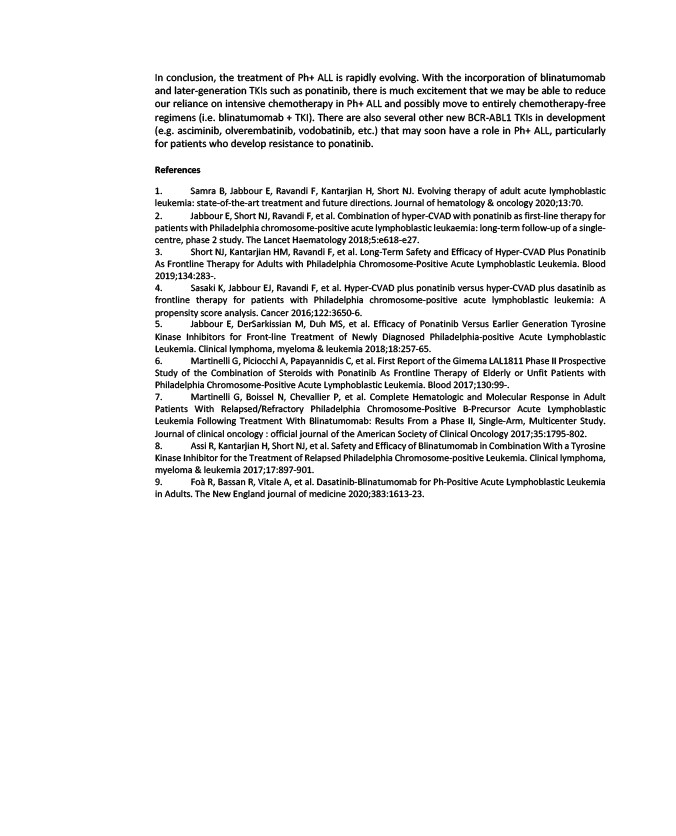
In conclusion, the treatment of Ph+ ALL is rapidly evolving. With the incorporation of blinatumomab
and later-generation TKIs such as ponatinib, there is much excitement that we may be able to reduce
our reliance on intensive chemotherapy in Ph+ ALL and possibly move to entirely chemotherapy-free
regimens (i.e. blinatumomab + TKI). There are also several other new BCR-ABL1 TKIs in development
(e.g. asciminib, olverembatinib, vodobatinib, etc.) that may soon have a role in Ph+ ALL, particularly
for patients who develop resistance to ponatinib.
References
1. Samra B, Jabbour E, Ravandi F, Kantarjian H, Short NJ. Evolving therapy of adult acute lymphoblastic
leukemia: state-of-the-art treatment and future directions. Journal of hematology & oncology 2020;13:70.
2. Jabbour E, Short NJ, Ravandi F, et al. Combination of hyper-CVAD with ponatinib as first-line therapy for
patients with Philadelphia chromosome-positive acute lymphoblastic leukaemia: long-term follow-up of a single-centre,
phase 2 study. The Lancet Haematology 2018;5:e618-e27.
3. Short NJ, Kantarjian HM, Ravandi F, et al. Long-Term Safety and Efficacy of Hyper-CVAD Plus Ponatinib
As Frontline Therapy for Adults with Philadelphia Chromosome-Positive Acute Lymphoblastic Leukemia. Blood
2019;134:283-.
4. Sasaki K, Jabbour EJ, Ravandi F, et al. Hyper-CVAD plus ponatinib versus hyper-CVAD plus dasatinib as
frontline therapy for patients with Philadelphia chromosome-positive acute lymphoblastic leukemia: A
propensity score analysis. Cancer 2016;122:3650-6.
5. Jabbour E, DerSarkissian M, Duh MS, et al. Efficacy of Ponatinib Versus Earlier Generation Tyrosine
Kinase Inhibitors for Front-line Treatment of Newly Diagnosed Philadelphia-positive Acute Lymphoblastic
Leukemia. Clinical lymphoma, myeloma & leukemia 2018;18:257-65.
6. Martinelli G, Piciocchi A, Papayannidis C, et al. First Report of the Gimema LAL1811 Phase II Prospective
Study of the Combination of Steroids with Ponatinib As Frontline Therapy of Elderly or Unfit Patients with
Philadelphia Chromosome-Positive Acute Lymphoblastic Leukemia. Blood 2017;130:99-.
7. Martinelli G, Boissel N, Chevallier P, et al. Complete Hematologic and Molecular Response in Adult
Patients With Relapsed/Refractory Philadelphia Chromosome-Positive B-Precursor Acute Lymphoblastic
Leukemia Following Treatment With Blinatumomab: Results From a Phase II, Single-Arm, Multicenter Study.
Journal of clinical oncology : official journal of the American Society of Clinical Oncology 2017;35:1795-802.
8. Assi R, Kantarjian H, Short NJ, et al. Safety and Efficacy of Blinatumomab in Combination With a Tyrosine
Kinase Inhibitor for the Treatment of Relapsed Philadelphia Chromosome-positive Leukemia. Clinical lymphoma,
myeloma & leukemia 2017;17:897-901.
9. Foà R, Bassan R, Vitale A, et al. Dasatinib-Blinatumomab for Ph-Positive Acute Lymphoblastic Leukemia
in Adults. The New England journal of medicine 2020;383:1613-23.